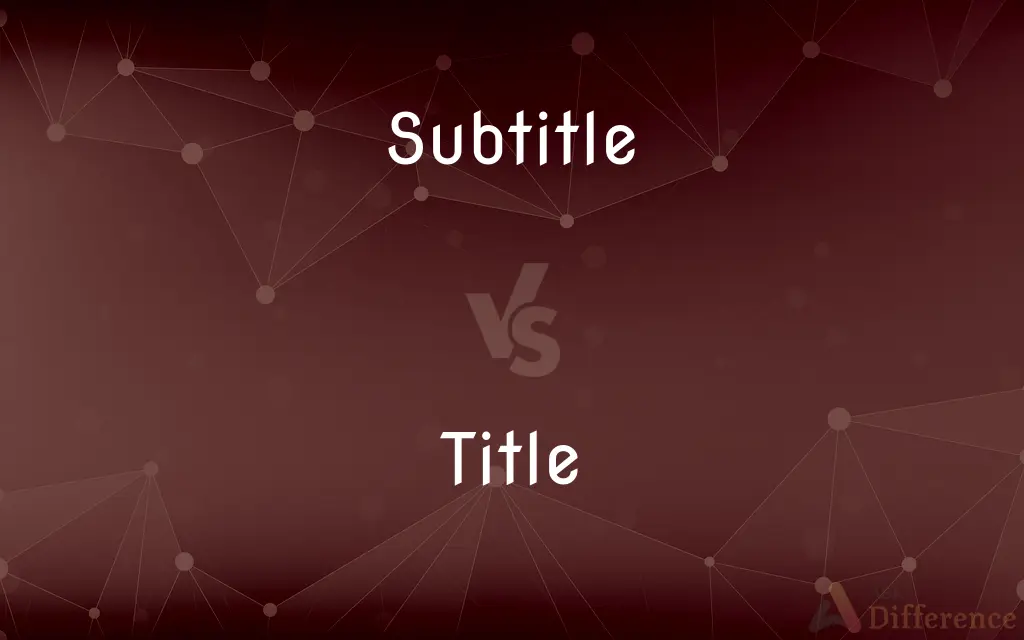Subtitle vs. Title — What's the Difference?
By Fiza Rafique & Urooj Arif — Updated on March 18, 2024
A title is the primary name of a work, highlighting its main theme or subject, while a subtitle provides additional information, clarifying or expanding on the title.

Difference Between Subtitle and Title
Table of Contents
ADVERTISEMENT
Key Differences
Titles serve as the identifying names of books, films, articles, and other works, capturing the essence of the content or its main theme. They are designed to be catchy, memorable, and reflective of the work's nature or purpose. On the other hand, subtitles are used to offer more detail about the work, such as its scope, purpose, or content, complementing the title by providing additional context or information that the title alone may not convey.
Titles are crucial for the first impression, often being the first thing a potential reader or viewer encounters. They can intrigue, inform, or attract attention, playing a significant role in the decision to explore the work further. Subtitles, while secondary, enhance understanding by elaborating on the title, potentially explaining the work's focus, setting, or perspective, making the overall premise clearer or more appealing.
In publishing, titles are essential for marketing and categorization, helping to position a book within its genre or field. Subtitles can further refine this positioning by narrowing down the subject matter, indicating a specific angle or approach, or highlighting unique aspects that distinguish the work from others in its category.
Titles often rely on brevity and impact, using creativity, metaphor, or other literary devices to make a strong impression. Subtitles, however, have the luxury of being more descriptive or explanatory, allowing authors or creators to clarify intentions, themes, or content without the constraints of needing to be as succinct or catchy as the title.
While the title of a work is its primary label and is used in most references, discussions, and citations, the subtitle can sometimes be omitted in casual conversation or in certain contexts where the title alone is sufficient to identify the work. However, the subtitle remains a valuable element in understanding the full scope and direction of the work, especially in academic, technical, or non-fiction genres where specificity is key.
ADVERTISEMENT
Comparison Chart
Purpose
To identify and summarize the main theme or subject of the work.
To clarify, expand, or provide additional information about the title.
Role
Primary identifier, first impression, key marketing tool.
Enhances understanding, offers detail, refines positioning.
Nature
Often catchy, memorable, and broadly reflective of content.
More descriptive or explanatory, providing context or specifics.
Usage
Used in most references, discussions, and citations.
Sometimes omitted in casual use, but crucial for full comprehension.
Impact
Critical for attracting attention and setting expectations.
Helps to clarify expectations and attract a specific audience.
Compare with Definitions
Subtitle
Primary name of a work.
The title Pride and Prejudice hints at the novel's themes.
Title
Provides additional information.
The subtitle The Modern Prometheus clarifies the theme of Frankenstein.
Subtitle
Can be symbolic or literal.
The title The Catcher in the Rye symbolizes the protagonist's desire to protect innocence.
Title
Can be descriptive or explanatory.
Academic works use subtitles to detail their study's scope and methodology.
Subtitle
First point of contact.
A book's title is often the first detail encountered by readers.
Title
Clarifies scope or focus.
Subtitles often indicate the specific angle or depth of the work.
Subtitle
Summarizes content or theme.
The title Brave New World reflects its dystopian nature.
Title
Complements the title.
Subtitles can explain, specify, or expand on the themes suggested by the title.
Subtitle
Captions displayed at the bottom of a cinema or television screen that translate or transcribe the dialogue or narrative
Films in foreign languages with English subtitles
Title
Helps in marketing and categorization.
Subtitles can make a work more appealing to its target audience by providing more context.
Subtitle
A subordinate title of a published work or article giving additional information about its content
The book had now acquired its final title with a qualifying subtitle
Title
A title is one or more words used before or after a person's name, in certain contexts. It may signify either generation, an official position, or a professional or academic qualification.
Subtitle
Provide (a film or programme) with subtitles
Much of the film is subtitled
Title
The name of a book, composition, or other artistic work
The author and title of the book
Subtitle
Provide (a published work or article) with a subtitle
The novel was aptly subtitled
Title
A name that describes someone's position or job
Leese assumed the title of director general
Subtitle
A secondary, usually explanatory title, as of a literary work.
Title
The position of being the champion of a major sports competition
Davis won the world title for the first time in 1981
Subtitle
A printed translation of foreign-language dialogue shown at the bottom of the screen, as in a film or a television broadcast.
Title
A right or claim to the ownership of property or to a rank or throne
The buyer acquires a good title to the goods
A grocery family had title to the property
Subtitle
To give a subtitle to.
Title
(in church use) a fixed sphere of work and source of income as a condition for ordination.
Subtitle
To provide with subtitles
A film that was subtitled for English-speaking audiences.
Title
Give a name to (a book, composition, or other work)
A report titled The Lost Land
Subtitle
(authorship) A heading below or after a title.
Title
An identifying name given to a book, play, film, musical composition, or other work.
Subtitle
Textual versions of the dialogue in films (and similar media such as television or video games), usually displayed at the bottom of the screen.
Title
A general or descriptive heading, as of a book chapter.
Subtitle
To create subtitles for the dialogue in a film.
Title
A written work that is published or about to be published
The titles in the publisher's fall catalog.
Subtitle
Translation of foreign dialogue of a movie or TV program; usually displayed at the bottom of the screen
Title
A division of a legal code, generally consisting of multiple related statutes.
Subtitle
Secondary or explanatory title
Title
Often titles Written material to be read by viewers that is included in a film or television show, typically presenting credits, narration, or dialogue.
Subtitle
Supply (a movie) with subtitles
Title
A written piece of translated dialogue superimposed at the bottom of the frame during a film; a subtitle.
Title
A formal appellation attached to the name of a person as a sign of office, rank, profession, or hereditary privilege.
Title
A descriptive name; an epithet
The dubious title of the worst bowler in the league.
Title
A right or claim, or the basis of a right or claim
"The weight of a fish is commonly its only title to fame" (Henry David Thoreau).
Title
A form of ownership free of valid claims by other parties.
Title
The aggregate evidence that gives rise to a legal right of possession or control.
Title
The instrument, such as a deed, that constitutes this evidence.
Title
Sports & Games A championship
Which boxer won the heavyweight title?.
Title
A source of income or area of work required of a candidate for ordination in the Church of England.
Title
A Roman Catholic church in or near Rome having a cardinal for its nominal head.
Title
To give a name or title to.
Title
An appellation given to a person or family to signify either veneration, official position, social rank, the possession of assets or properties, or a professional or academic qualification. See also :Category:Titles
Title
(property law) Legal right to ownership of a property; a deed or other certificate proving this.
A good title to an estate, or an imperfect title
Title
In canon law, that by which a beneficiary holds a benefice.
Title
A church to which a priest was ordained, and where he was to reside.
Title
The name of a book, film, musical piece, painting, or other work of art.
I know the singer's name, but not the title of the song.
Title
A publication.
The retailer carries thousands of titles.
Buyers of the new video game console can choose from three bundled titles.
Title
A section or division of a subject, as of a law or a book.
Title
A written title, credit, or caption shown with a film, video, or performance.
The titles scrolled by too quickly to read.
Title
(bookbinding) The panel for the name, between the bands of the back of a book.
Title
The subject of a writing; a short phrase that summarizes the entire topic.
Title
A division of an act of law
Title II of the USA PATRIOT Act
Title
(sports) The recognition given to the winner of a championship in sports.
Title
A long title.
Title
A short title.
Title
(transitive) To assign a title to; to entitle.
Title
An inscription put over or upon anything as a name by which it is known.
Title
The inscription in the beginning of a book, usually containing the subject of the work, the author's and publisher's names, the date, etc.
Title
The panel for the name, between the bands of the back of a book.
Title
A section or division of a subject, as of a law, a book, specif. (Roman & Canon Laws), a chapter or division of a law book.
Title
An appellation of dignity, distinction, or preëminence (hereditary or acquired), given to persons, as duke marquis, honorable, esquire, etc.
With his former title greet Macbeth.
Title
A name; an appellation; a designation.
Title
That which constitutes a just cause of exclusive possession; that which is the foundation of ownership of property, real or personal; a right; as, a good title to an estate, or an imperfect title.
Title
A church to which a priest was ordained, and where he was to reside.
Title
To call by a title; to name; to entitle.
Hadrian, having quieted the island, took it for honor to be titled on his coin, "The Restorer of Britain."
Title
A heading that names a statute or legislative bill; may give a brief summary of the matters it deals with;
Title 8 provided federal help for schools
Title
The name of a work of art or literary composition etc.;
He looked for books with the word `jazz' in the title
He refused to give titles to his paintings
I can never remember movie titles
Title
A general or descriptive heading for a section of a written work;
The novel had chapter titles
Title
The status of being a champion;
He held the title for two years
Title
A legal document signed and sealed and delivered to effect a transfer of property and to show the legal right to possess it;
He signed the deed
He kept the title to his car in the glove compartment
Title
An identifying appellation signifying status or function: e.g. Mr. or General;
The professor didn't like his friends to use his formal title
Title
An established or recognized right;
A strong legal claim to the property
He had no documents confirming his title to his father's estate
He staked his claim
Title
(usually plural) written material introduced into a movie or TV show to give credits or represent dialogue or explain an action;
The titles go by faster than I can read
Title
An appellation signifying nobility;
`your majesty' is the appropriate title to use in addressing a king
Title
An informal right to something;
His claim on her attentions
His title to fame
Title
Give a title to
Title
Designate by an identifying term;
They styled their nation `The Confederate States'
Common Curiosities
Why do some works have subtitles while others do not?
The use of subtitles depends on the creator's preference and whether additional context or clarification is needed beyond what the title conveys.
How do titles and subtitles function in series or sequels?
In series or sequels, titles often indicate the series name or number, while subtitles can hint at the specific installment's focus or theme.
Can a subtitle change the perception of a title?
Yes, subtitles can significantly influence how a title is interpreted, providing context that alters or deepens the initial impression.
Is it necessary to include the subtitle when citing a work?
In formal citations, including the subtitle is often required to accurately reference the work, especially if it adds important context.
Can a work have multiple subtitles?
While uncommon, it's possible for a work to have more than one subtitle, especially if it covers multiple significant aspects that require highlighting.
Can the absence of a subtitle affect a work's reception?
Depending on the work, the absence of a subtitle might leave potential audiences without crucial context, possibly affecting their interest or understanding.
How are titles and subtitles chosen?
Titles and subtitles are usually chosen by the author, often in collaboration with editors or publishers, based on their effectiveness in conveying the work's essence and appeal.
Are subtitles more common in certain genres or fields?
Subtitles are particularly prevalent in academic, non-fiction, and technical works where specificity and clarity about the content's scope are essential.
How do digital platforms affect the use of subtitles?
Digital platforms often emphasize searchability and clarity, which can influence the use of more descriptive or keyword-focused subtitles for better visibility.
Do titles and subtitles have different roles in different media?
Yes, while the fundamental roles of titles and subtitles are consistent, their specific applications can vary across books, films, academic works, and articles, reflecting different needs and conventions.
Share Your Discovery

Previous Comparison
Hyperboloid vs. Paraboloid
Next Comparison
Dentelle vs. LaceAuthor Spotlight
Written by
Fiza RafiqueFiza Rafique is a skilled content writer at AskDifference.com, where she meticulously refines and enhances written pieces. Drawing from her vast editorial expertise, Fiza ensures clarity, accuracy, and precision in every article. Passionate about language, she continually seeks to elevate the quality of content for readers worldwide.
Co-written by
Urooj ArifUrooj is a skilled content writer at Ask Difference, known for her exceptional ability to simplify complex topics into engaging and informative content. With a passion for research and a flair for clear, concise writing, she consistently delivers articles that resonate with our diverse audience.















































